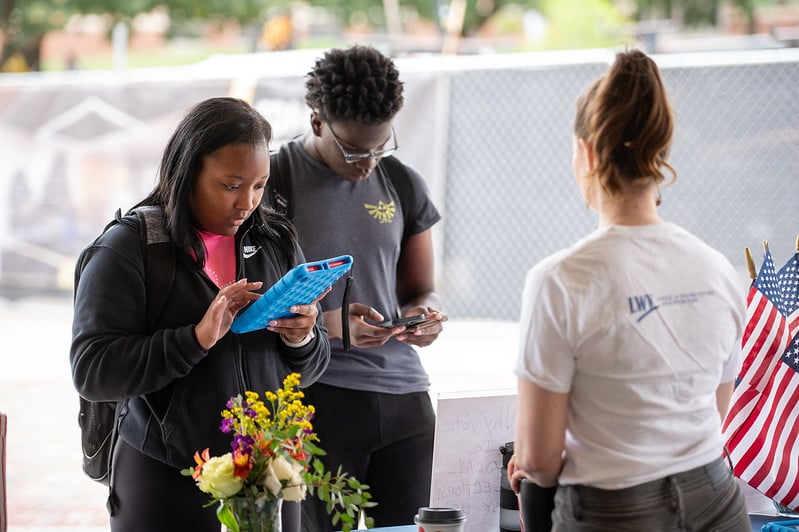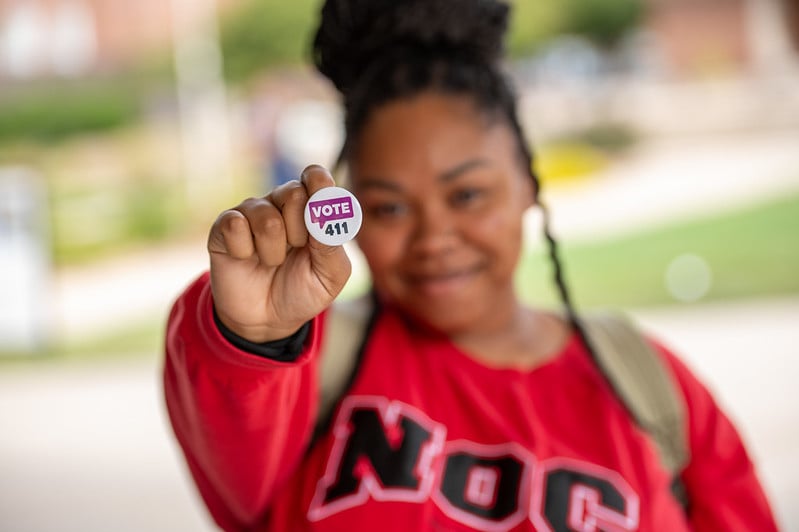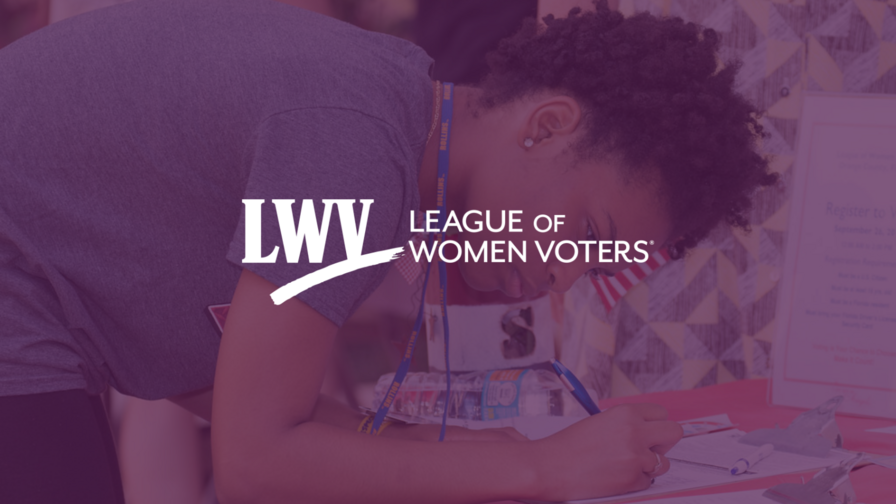Why We Need Young Voters
If we want to create a more inclusive democracy that represents the diverse needs of its people, we must empower young voters.
This isn’t just because young voters have the power to decide our upcoming elections – though voters aged 18-34 will make up over 40 million potential voters in 2024, nearly one-fifth of the American electorate.
Stay Updated
Keep up with the League. Receive emails to your inbox!
It’s also because young voters’ diversity, fresh perspectives, and status as the future leaders of our nation make their voices critical in shaping our nation’s future.
LWV is committed to empowering young voters; you should be, too!
Young Voters Offer Fresh, Diverse Perspectives
Part of the young electorate’s strength is its diversity. According to Tuft’s Center for Information and Research on Civic Learning and Engagement (CIRCLE), today’s young voters are the most diverse in American history and the most diverse group in our electorate.

It’s estimated that by 2025, 50% of 14–24-year-olds will be people of color; this is a striking 11% increase compared to two decades prior. Younger voters are also more likely to identify as members of the LGBTQ+ community. Per 2021 Gallup data, 20.8% of Gen Z adults and 10.5% of Millennials identified as a sexual and/or gender minority, compared to 4.2% of Gen Xers and 2.6% of Baby Boomers.
Young voters’ diversity across race, gender, class, sexuality, and other intersections of identity leads them to speak to a wide-ranging, representative set of issues. Their multifaceted perspectives also allow them to bring fresh approaches to topics like the economy, gun reform, and abortion justice. Mobilizing them to vote empowers them to use these fresh approaches to introduce innovative solutions into our democracy.
Empowering Young Voters Will Restore Faith in Democracy
Young voters are passionate about the issues that impact them. That’s why they’re at the forefront of our community-based activism. Research suggests that Gen Z is the most likely generation to boycott a product, company, country, or state because of an ethical stance; only one in five Gen Z-ers would work for a company that doesn’t share their values, and 70% of Gen Z-ers are involved in at least one social or political cause.
Yet many voters are disillusioned with the democratic process. According to the University of Cambridge, young people’s faith in democratic politics is the lowest of all age groups and is declining steadily. In CIRCLE’s survey, only 35% of young people reported feeling supported to act on their political concerns; less than 1 in 5 reported hearing from a political party or community organization in the last year.
This impacts how young people vote. While CIRCLE found that more than half of the young people involved said they were “extremely likely” to vote in the 2024 election, rates were lower within communities who felt less supported, such as Black and multiracial voters or young people without college experience. It’s no coincidence that these same communities have historically experienced voter suppression and discrimination rather than empowerment and mobilization.
A lack of political support – not to mention historic voter suppression – is a recipe for fewer votes. We must empower voters to feel agency and responsibility in the democratic process. We must foster an environment where they can self-actualize, lead, and collaborate instead of simply falling in line. This means equipping young voters with the tools and opportunities to be informed about and take action in shaping the political landscape.

How to Empower Young Voters
Encouraging leadership and supporting initiatives driven by young voters allows them to take ownership of their civic responsibilities, contributing to a more robust and participatory democracy. One way to do so is to support young-voter-driven organizations, like:
- Alliance for Youth Action
- Future Coalition
- NextGen America
- Rhizome
- Young Invincibles
- Youth Voter Movement
It’s also essential to provide young people with the information they need to get involved. To this end, the League launched our Youth Voter Registration program in 2010. In the first half of 2023 alone, 86 of our 750+ Leagues registered more than 19,000 young voters in high schools, community colleges, technical and vocational schools, and other areas. They also reached more than 85,000 young people with voting information. And these numbers only account for those 86 Leagues, meaning the actual number of young voters impacted is much higher.
Empower young voters in your community by joining your local League!
Whether we’re sharing election information or supporting young-voter-led organizations, it’s important to speak about the issues that matter most to younger generations. CIRCLE’s survey suggested that the top issues for young people include inflation/cost of living, jobs that pay a living wage, gun violence, and climate change. Because young people are not a monolith, these issues change slightly within different communities; for example, Black youth are significantly more likely to prioritize gun violence prevention, fighting racism, and student debt. These priority issues should impact how we engage with young voters to ensure we meet their needs.
The 2024 election is expected to be highly competitive, and we can’t afford to leave any voices out. We must empower young voters, particularly in states where they're predicted to have an especially strong influence on election results, like Arkansas, Florida, Georgia, Michigan, Minnesota, Nevada, New Hampshire, North Carolina, Pennsylvania, and Wisconsin.
No matter which state we’re in, we must ensure all our voices are represented in our democracy. That includes our most diverse and activism-oriented voters – the same ones who’ll inherit our nation. They deserve to shape their futures. It’s our job to support them.
The Latest from the League
The League of Women Voters Education Fund has registered, educated, and engaged young people through its Youth Voter Registration project since 2010.
In January – June 2023, 86 Leagues hosted close to 1000 events and registered over 19,000 youth in high schools, community colleges, technical and vocational schools, and other youth-serving areas, like community and recreation centers. And that’s just the 86 Leagues mentioned — our 750+ Leagues nationwide did even more!
DURHAM — North Carolina’s Senate Bill 747 (SB747) is an unconstitutional burden on the fundamental right to vote of young North Carolinians, according to a new lawsuit filed in federal court today by the League of Women Voters of North Carolina, Democracy North Carolina, and North Carolina Black Alliance, with representation by Southern Coalition for Social Justice.
Casting your vote, especially if it’s your first time, can seem complicated. To make it simple, we’ve compiled some of the most common questions we’ve received from college and university students.
Sign Up For Email
Keep up with the League. Receive emails to your inbox!
Donate to support our work
to empower voters and defend democracy.





